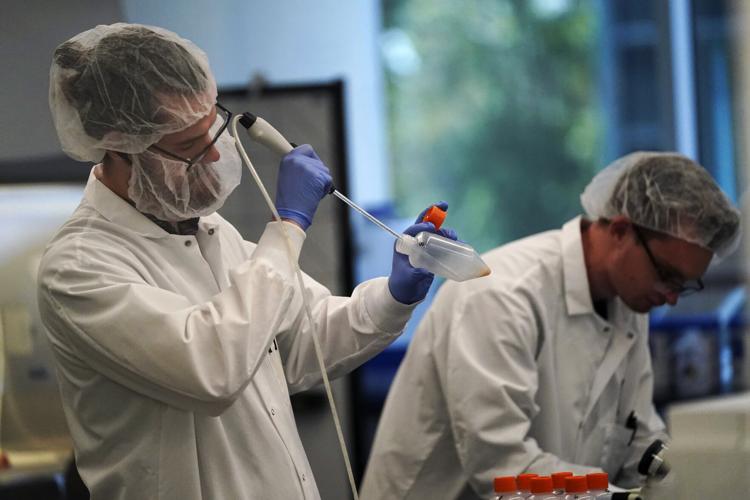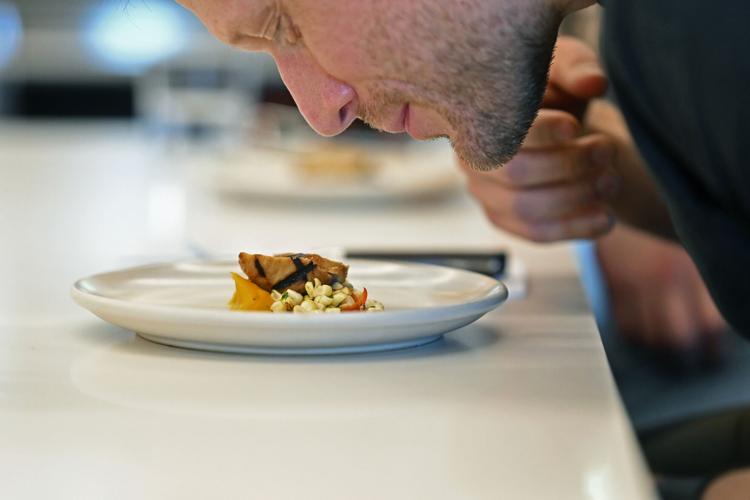PHOENIX — It won’t be illegal in Arizona to call food products grown in a laboratory “meat,’’ “poultry’’ or “fish.’’
But marketers will have to add a clear label specifying it’s not from a live animal.
A bill that would have banned use of those terms on lab-grown items sold in Arizona stores, pushed by a Republican House member, was watered down in the state Senate on Wednesday. Sen. John Kavanagh added an amendment that stripped out the prohibition on calling lab-grown proteins by their familiar names.
“This bill originally started out as a bill which simply said that if meat is cultured in a lab, which is a new technology, that it couldn’t be called meat,’’ Kavanagh told fellow senators. He called that “kind of ridiculous.’’
The Fountain Hills Republican said he worked with the bill sponsor, Rep. Quang Nguyen, R-Prescott Valley, to turn what Kavanagh called a “kind of a protectionist bill’’ into one that instead will ensure consumers are fully aware of what they’re buying.
“If you sell this, you have to make people know that they’re not getting good old-fashioned off-the-hoof meat or fish or poultry or chicken or lamb or goat,’’ Kavanagh said.

Scientists work in a bioprocess lab at Eat Just in Alameda, California. The U.S. Agriculture Department issued final approvals in June 2023 to California firms Upside Foods and Good Meat to sell the products, known as “lab grown” or “cultivated” meat.
“You can call it ‘meat,’ but you have to use an adjective such as cell cultured, lab-grown, etc. And that has to be in prominent type and close proximity to the word ‘meat,’ ‘’ he said.
The bill now needs a formal Senate vote and then must return to the House for final approval before heading to Democratic Gov. Katie Hobbs for her signature or veto.
Cattle ranchers’ role
The disclosure requirement is far different from the original bill, which had protectionist aspects.
Cattle growers pushed House Bill 2244, testifying that the emerging market for lab-grown protein products is a problem for the industry. GOP House lawmakers agreed.
“We want to protect our cattle and our ranches,’’ Rep. Michael Carbone, R-Buckeye, said during a House hearing.
But the measure also dabbled in the emerging markets for plant-based meat substitutes and the conundrum that marketers and consumers find themselves in when buying or selling those products.

A taster smells cultivated chicken before sampling it at GOOD Meat's Alameda, California, headquarters. The company's cultivated chicken is grown from animal cells.
House members debated whether current labeling rules made sure people knew what they were buying.
Plant-based “burgers’’ got a cold shoulder from a Globe Republican who raises beef cattle.
“What they find is these plant-based products, they’re not all what they appear to be,’’ Rep. David Cook said. For proper nutrition, he said, you need meat “from a real steak, from a carcass.’’
Opposition to the measure in the House came from a lobbyist for the Good Food Institute, a nonprofit that says it is focused “on making plant-based and cultivated meat delicious, affordable and accessible.’’
Lobbyist Drake Jamali told a House committee in January that the U.S. Food and Drug Administration already requires anything produced in a lab to be labeled a “cell cultured’’ or “cell cultivated’’ product. That’s enough to inform shoppers that what they’re buying never came from a live animal, he said.
Kavanagh said grocers and other food industry groups were also concerned about different labeling rules being enacted in Arizona. He said he worked with them as well as cattle growers and Nguyen to come up with the changes adopted by the Senate on Wednesday.
No ban on sales
A much broader bill that would have put in place an outright ban on the sale or production of any “cell-cultured animal product for human or animal consumption’’ appears dead for the year.
Its sponsor, Rep. David Marshall, R-Snowflake, called it “a matter of statewide concern necessary to protect public health.’’
But the verbiage of his HB 2121 also suggested another motive: protection of the state’s cattle ranchers. In fact, his legislation would have allowed anyone whose business is “adversely affected’’ by the sale of lab-grown meats to sue to stop the practice and be able to collect damages of up to $100,000.
It passed the House with only support from majority Republicans in February but never got a hearing in the Senate. Marshall had vowed to make major changes to his proposal, but they never came.
For the first time, U.S. regulators on Wednesday approved the sale of chicken made from animal cells, allowing two California companies to offer “lab-grown” meat to the nation's restaurant tables and eventually, supermarket shelves. The Agriculture Department gave the green light to Upside Foods and Good Meat, firms that had been racing to be the first in the U.S. to sell meat that doesn't come from slaughtered animals — what's now being referred to as “cell-cultivated" or “cultured” meat as it emerges from the laboratory and arrives on dinner plates. The move launches a new era of meat production aimed at eliminating harm to animals and drastically reducing the environmental impacts of grazing, growing feed for animals and animal waste.





